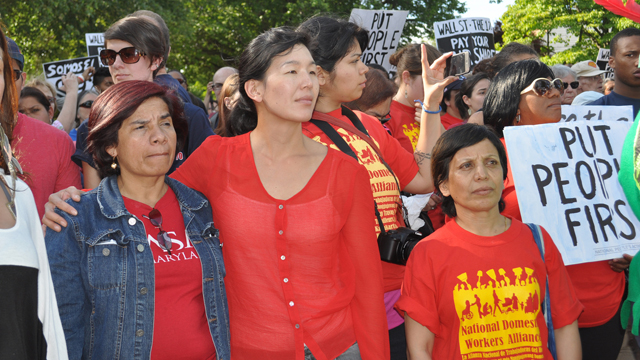
Ai-jen Poo with members of the National Domestic Workers Alliance at a rally in Washington, DC. (Photo Credit: Bekah Mandell)
As we kick off the new year, Moyers & Company asked some of the people trying to change the world for the better to tell us what their hopes are for 2014. Here’s what Ai-jen Poo, head of the National Domestic Workers Alliance, told us.
In 2013, nearly two million home care workers were brought under the protection of minimum wage and overtime laws after 75 years of being excluded. And in Hawaii and California, domestic workers finally won some basic rights. It is not lost on us that we achieved these victories for domestic workers, a majority of whom are women of color, during the same year that we celebrated the 50th Anniversary of the March on Washington.
These victories show that the arc of justice bends, but slowly. It still needs to bend much more.
In every state in America, nannies, housekeepers and caregivers for our aging loved ones and people with disabilities work in private homes doing the work that makes all other work possible. And yet in 47 states, domestic workers are still not recognized or counted as real workers and given basic legal protections and rights accordingly. This, despite the fact that professional caregiving is essential to our families and our economy, and the aging of baby boomers is only expanding this need. The caregiver workforce is disproportionately women, who need decent wages and overtime protections to in turn provide for their own families.
These and other basic measures would make a tremendous difference to millions of low-wage workers and boost our economy. Our vision should reach far beyond this to innovate new social policy, economic solutions and forms of collaboration, while championing our long-standing goals like a living wage, universal child care and long-term care, paid leave and sick time and pathways to increase opportunity for all. In 2014, our work should be much bolder and move us beyond incremental changes toward a new norm where quality jobs replace the poverty jobs that have come to define so much of our economy.
What we need is new thinking, new policy and new models representing a powerful continuation of the legacy of the March on Washington, the civil rights movement and the women’s rights movement. As women of color mobilize in unprecedented ways to assert their leadership and rights, their leadership reminds us to dream big today and to work to make the impossible possible, as previous generations did. Let’s build upon the important steps achieved in 2013, with a transformative vision for the future of work and our economy, ensuring that it truly works for all of us.


